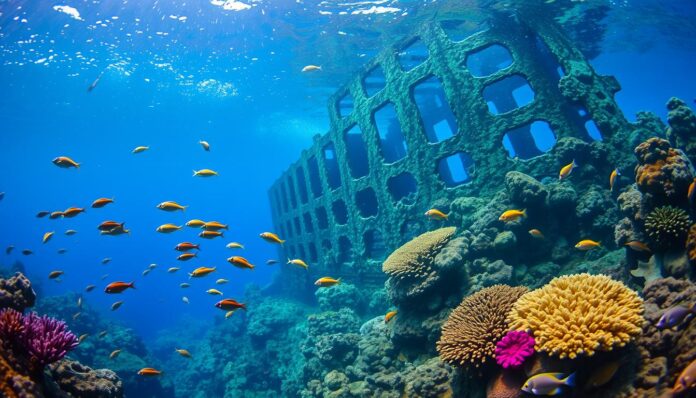| Best Time to Travel | December to April |
| What to Expect | Warm water, clear visibility, diverse marine life |
| Diving Conditions | Year-round, but best from December to April |
| Marine Life | Whale sharks, reef sharks, turtles, rays, dolphins, fish |
Ever wondered what an underwater paradise looks like? The Dominican Republic shows us what happens when clear waters meet amazing marine life. It turns this dream into a real-life adventure.
The Dominican Republic is a big deal for scuba diving. It’s the second largest Caribbean country. Just a two-hour flight from Miami, it has over 20 dive sites. These sites offer unforgettable dives for all levels of divers.
Diving in the Dominican Republic is more than just a hobby. It’s a chance to see vibrant marine ecosystems up close. The waters are warm, averaging 82ºF. At places like La Sirena Cave, you can see up to 200 feet underwater. It’s a world full of diverse marine life.
Key Takeaways – Scuba Diving in The Dominican Republic
- Discover over 20 diverse dive sites across the Dominican Republic
- Experience year-round diving in warm tropical waters
- Encounter unique marine species like nurse sharks and sea turtles
- Enjoy exceptional underwater visibility up to 200 feet
- Convenient access from major US cities like Miami and New York
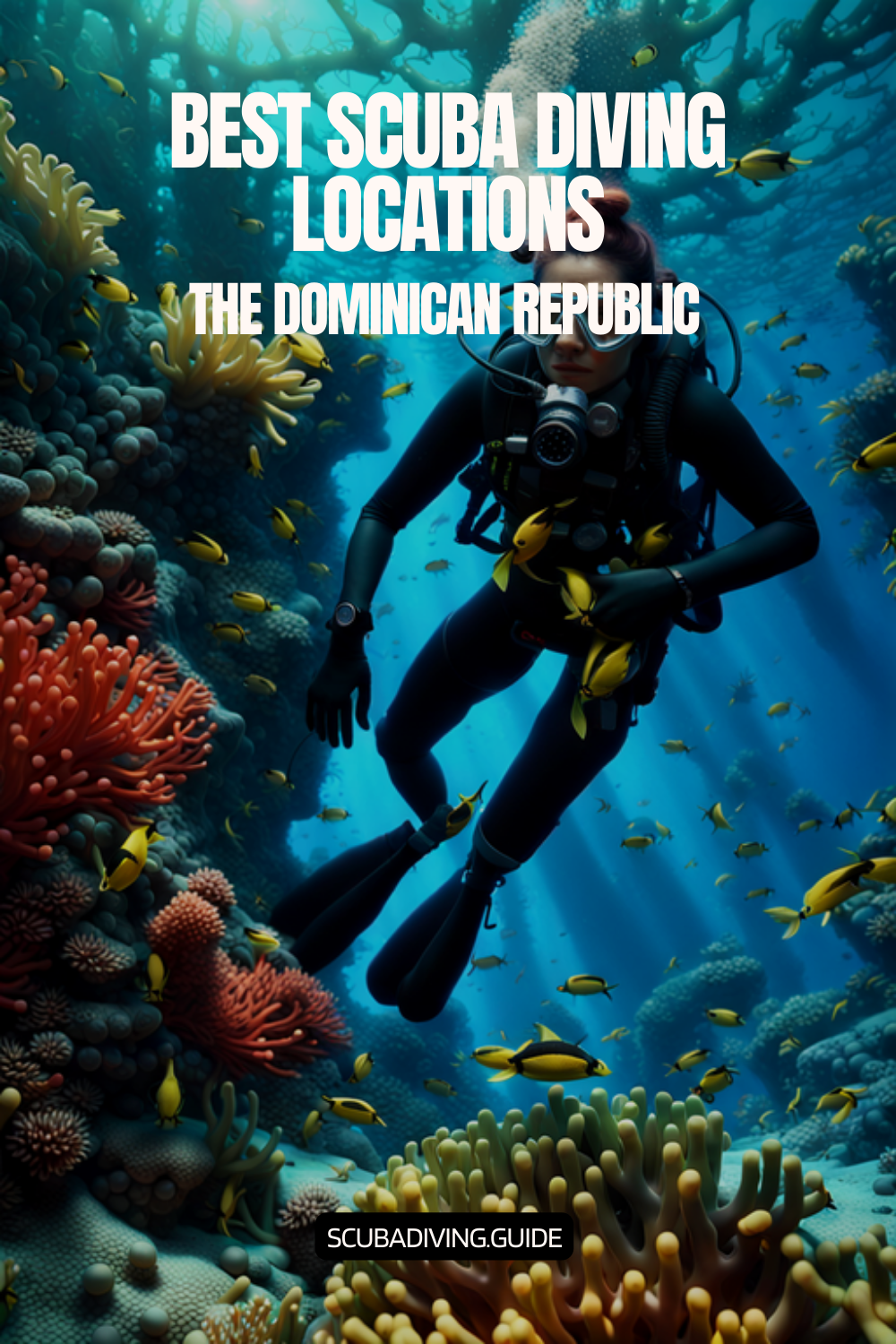
Introduction to Scuba Diving in The Dominican Republic
The Caribbean diving spots are unmatched, with the Dominican Republic leading the way. It’s a tropical gem in the Caribbean, known for its stunning marine views and unique underwater experiences.
- Crystal-clear waters with exceptional visibility
- Water temperatures ranging from 76-83°F year-round
- Diverse marine ecosystems
- Multiple dive sites suitable for all skill levels
The Allure of Caribbean Diving
Exploring the Dominican Republic’s underwater world is a treat. Its long coastline has everything from colorful coral reefs to shipwrecks. Divers can dive into pristine underwater landscapes for unforgettable moments.
Ideal Conditions for Divers
The Dominican Republic is perfect for diving, no matter your skill level. Here are some stats that show why:
- Visibility range: 50 – 100 feet
- Dive site depths: 30 – 100 meters
- Multiple dive packages available
- Daily boat dives offered 6 days a week
“The Dominican Republic is a hidden gem for Caribbean diving destinations, with top-notch underwater exploration.” – Diving Enthuasiast Magazine
With top dive operators, a wide range of courses, and stunning marine life, the Dominican Republic is a top choice for divers. It offers unmatched underwater adventures.
Best Scuba Diving Locations in the Dominican Republic
The Dominican Republic is a paradise for scuba diving lovers. It has diverse marine landscapes and clear dive sites. This Caribbean gem is perfect for all divers, from beginners to experts.
Divers will find amazing underwater adventures in several stunning places:
- Depths ranging from 9 to 30 meters
- Visibility between 15-30 meters
- Water temperatures around 24-28°C
Catalina Island: A Diving Jewel
Catalina Island is off the southeastern coast. It has crystal-clear waters and stunning coral landscapes. Divers can see vibrant marine life with gentle currents, great for all levels.
“Catalina Island represents the quintessential Caribbean diving experience” – Local Diving Expert
The North Coast: Adventurous Diving Terrain
The North Coast, like Puerto Plata and Sosúa, offers thrilling drift dives. It has underwater caverns and lively marine areas. These are perfect for seasoned divers looking for a challenge.
Saona Island: Marine Paradise
Saona Island is in the East National Park. It has untouched coral reefs full of marine life. Its protected status makes it ideal for those seeking real marine experiences.
No matter your diving level, these spots promise unforgettable underwater trips. Explore the Dominican Republic’s amazing marine world.
Understanding the Coral Reefs
The underwater world of the Dominican Republic is full of vibrant coral formations. Divers get to see amazing marine life up close. These encounters are both stunning and very important for science.
Coral reefs are key habitats for many sea creatures. In the Dominican Republic, they cover about 166 kilometers of coast. They are home to 64 different coral species.
The Ecological Significance of Coral Reefs
These underwater structures are very important:
- They give homes to sea animals
- They help protect the coast from erosion
- They support a wide range of sea life
- They help the local economy through tourism
Diverse Coral Types in Dominican Waters
Divers can find many coral types, including:
| Coral Type | Characteristics | Typical Depth Range |
|---|---|---|
| Brain Coral | Rounded, textured surface resembling brain folds | 5-25 meters |
| Elkhorn Coral | Broad, antler-like branches | 1-15 meters |
| Fan Coral | Delicate, fan-shaped structures | 10-40 meters |
Each coral type has its own role in the sea. This makes diving a fascinating experience for everyone.
“The coral reefs are not just beautiful landscapes, they are living, breathing ecosystems that sustain an incredible web of marine life.” – Marine Biologist
The Dominican Republic has perfect diving weather all year. Sea temperatures are between 75°F and 84°F. This makes diving there unforgettable.
Marine Life to Expect
Exploring the underwater world in the Dominican Republic is a treat. You’ll see a rich marine ecosystem full of diverse creatures. It’s a true underwater paradise.
The Caribbean waters around the Dominican Republic are home to many sea creatures. Divers will see colorful and unique fish and other sea animals.
Tropical Fish Species
Exploring underwater means seeing many tropical fish. You’ll see:
- Angelfish with their bright colors
- Parrotfish swimming by coral
- Butterflyfish moving through reefs
- Trumpet fish hiding in sea plants
- Pufferfish showing off their defense
Larger Marine Species
But there’s more than just small fish. Divers will also see bigger, fascinating creatures. These make the Dominican Republic’s waters truly special.
| Marine Species | Typical Observation Period | Depth Range |
|---|---|---|
| Stingrays | Year-round | 5-30 meters |
| Spotted Rays | Year-round | 10-25 meters |
| Moray Eels | Year-round | 5-20 meters |
| Sea Turtles | Year-round | 5-30 meters |
| Nurse Sharks | December-April | 15-30 meters |
Pro tip for marine life encounters: Winter months (December to March) offer exceptional opportunities to witness migrating humpback whales, adding an extraordinary dimension to your underwater exploration.
“The ocean is a magical world waiting to be discovered, and the Dominican Republic offers a window into this incredible marine universe.” – Marine Exploration Magazine
Popular Dive Sites
The Dominican Republic is home to amazing Shipwreck Diving Sites. These sites draw divers from all over the world. They offer unique experiences for everyone, from beginners to experts.
Underwater landscapes and historical treasures await divers. You’ll see everything from stunning reefs to old shipwrecks. Each dive site is a special experience.
The Wall at the Grand Shark
This dive site is known for its dramatic drop-off. It’s perfect for advanced divers. The wall goes down into deep blue waters, filled with marine life.
- Vertical cliff-like underwater formations
- Rich marine ecosystem
- Depth ranges from 30-100 feet
- Excellent visibility of 50-100 feet
The Cow Pen
The Cow Pen is a unique dive site. It has an interesting underwater landscape. Divers can explore caverns and swim-throughs, finding hidden treasures.
The St. George Wreck
The St. George is a famous shipwreck in the Dominican Republic. It’s a 240-foot freighter at 144 feet deep. This wreck is a must-see for advanced divers.
| Wreck Details | Specifications |
|---|---|
| Length | 240 feet |
| Depth | 144 feet |
| Dive Difficulty | Advanced |
| Marine Life | Diverse ecosystem |
Diving these sites requires proper certification and experience. Always dive with a professional guide who knows the local conditions and can ensure your safety.
“The underwater world of the Dominican Republic is a treasure trove of natural beauty and historical wonders.” – Local Diving Expert
Dive Certifications and Requirements
Scuba Diving in The Dominican Republic is exciting for all divers. Knowing the certification process is key for a safe and fun dive.
PADI Dive Certifications are a great way to explore the Caribbean’s underwater world. Whether you’re new or experienced, there’s a level for you.
Certification Levels Overview
- Discover Scuba Diving: For ages 10 and up
- 1-2 dives
- Cost: $99-$149
- Maximum depth: 12 meters (40 feet)
- Open Water Diver Certification
- 5 pool sessions and 4 boat dives
- Cost: $449
- Maximum depth: 18 meters (60 feet)
- Advanced Open Water Course
- 5 boat immersions
- Cost: $419
- Includes deep diving and navigation specialties
Recommended Certification Agencies
PADI is the top choice for Scuba Diving in The Dominican Republic. They offer courses for all skill levels and ages.
“PADI certifications open the door to underwater exploration and marine adventures”
Divers can move up from beginner to professional levels. Each course boosts skills and confidence. Dive shops in the Dominican Republic provide detailed training to become a certified diver.
Dive Shops and Operators
Finding the right dive operator can make your underwater adventure in the Dominican Republic unforgettable. The country has many Dominican Diving Resorts for all skill levels, from beginners to experts.
When looking for diving options, consider a few important things for a safe and fun experience:
- Proximity to major tourist areas
- Equipment quality and maintenance
- Instructor qualifications
- Safety protocols
Recommended Dive Shops in Punta Cana
Punta Cana has several top dive operators. Dressel Divers is a top choice for professional PADI Dive Certifications. They have experienced instructors and well-kept equipment for a great diving experience.
North Coast Diving Operators
The North Coast offers unique diving spots. Dive Sosua is known for exploring local reefs and underwater landscapes. They offer trips that show off the area’s marine life.
Safety Standards to Consider
Choose dive operators with recognized certifications. Look for:
- Current safety certifications
- Well-maintained diving equipment
- Experienced and qualified instructors
- Comprehensive safety briefings
“Your safety is the most important part of any diving adventure” – Professional Diving Instructor
Many reputable dive shops in the Dominican Republic offer great services. They have equipment rental, transportation, and post-dive storage. With international airports nearby, getting to these diving spots is easy.
Best Time to Dive in the Dominican Republic
Exploring the Caribbean’s diving spots needs the right timing. The Dominican Republic is perfect all year round. Knowing when to dive can make your underwater adventure unforgettable.
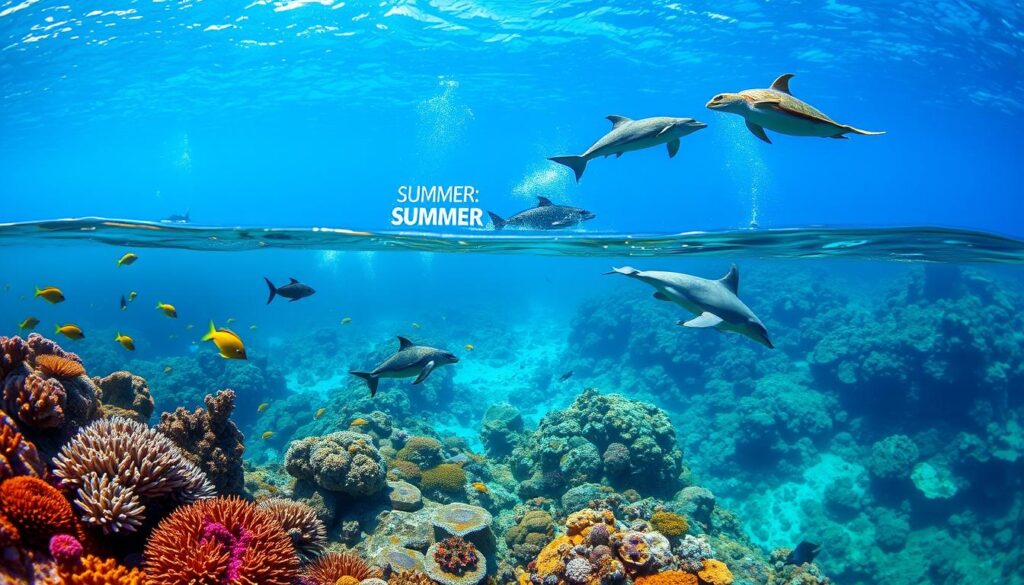
The Dominican Republic is great for diving all year. The water is between 76°F and 83°F, making it comfy for diving.
Seasonal Marine Life Migrations
Winter (December to March) is the best time for diving. You can see humpback whales migrating in the Silver Bank. It’s a chance to see these amazing creatures up close.
- Humpback whales arrive from January through April
- Thousands of whales congregate in Silver Bank
- Peak whale watching occurs in February and March
Weather Conditions and Visibility
Diving conditions change along the coast. The southern coast is usually more stable for diving.
| Season | Water Temperature | Visibility Range |
|---|---|---|
| Winter (December-March) | 76°F | Up to 100 feet |
| Summer (June-November) | 83°F | 20-60 feet |
Pro tip: Avoid hurricane season (June to October) for more predictable diving conditions.
“The Dominican Republic offers a diving experience that combines breathtaking marine life with stunning underwater landscapes.” – Caribbean Diving Experts
Recommended spots include Santo Domingo, Puerto Plata, Punta Cana, and Bayahibe. Each place has its own unique diving experience. It’s perfect for all diving levels.
Night Diving Experiences
Exploring underwater at night in the Dominican Republic is magical. It turns familiar places into mysterious worlds. Divers get a unique look at the night life under the sea.
Benefits of Night Diving
Diving at night in the Dominican Republic shows a different world. Divers meet creatures that hide during the day:
- See nocturnal animals like octopuses and lobsters
- Watch bioluminescent displays
- See coral polyps feeding
- Enjoy fewer divers around
Notable Night Dive Spots
The Dominican Republic has great spots for night dives:
- Bayahibe: Known for clear waters and lots of marine life
- Catalina Island: Has colorful coral reefs and many sea creatures
- Grand Shark Wall: Offers amazing underwater views
“Night diving is like entering a different universe – mysterious, silent, and absolutely mesmerizing.” – Professional Dive Instructor
Safety is key at night. Divers need strong lights, stay close to their buddy, and follow guides. The calm waters and expert dive operators make for a memorable dive.
Underwater Photography Tips
Exploring underwater in the Dominican Republic is a photographer’s dream. The Caribbean waters are perfect for capturing stunning images of marine life. These photos tell a story of the ocean’s hidden world.
Choosing the right gear is key for great underwater photos. The first 10 meters of water are full of vibrant colors. Picking the right equipment is essential for amazing shots.
Essential Photography Equipment
- Compact underwater cameras for beginners
- Smartphone housings with waterproof protection
- DSLR cameras with specialized underwater cases
- Wide-angle lenses for reef and large marine life
- Macro lenses for detailed creature photography
Capturing Marine Life Responsibly
Professional underwater photographers know how to capture marine life without harming it. They follow important rules:
- Maintain neutral buoyancy to avoid disturbing marine habitats
- Use natural light whenever possible
- Keep a respectful distance from marine creatures
- Minimize artificial light exposure
“Patience is the underwater photographer’s greatest tool. Let the marine world reveal itself naturally.”
Macro photography is great for beginners. It lets you get close to stationary subjects. This reduces water particle interference. Places like the Peñon are perfect for photos of Caribbean reef squid, cleaner shrimp, and seahorses.
Technical Photography Tips
Understanding underwater optics is vital. Objects look bigger underwater, so getting close improves your photos. Consider a compact camera like the Canon G16. It helps you learn from automatic to manual settings.
Environmental Responsibility in Scuba Diving
Sustainable eco-tourism in Caribbean diving spots means protecting marine life. The Dominican Republic’s underwater world is delicate and needs our care. Divers must respect and preserve this environment.
Protecting Coral Reefs
Coral reefs are key habitats for many species. In the Dominican Republic, saving these reefs is urgent. Important steps include:
- Maintaining proper buoyancy control during dives
- Avoiding direct contact with coral structures
- Using reef-safe sunscreen and environmental protection products
- Participating in local reef restoration programs
“Every dive is an opportunity to become a guardian of the marine environment.” – Environmental Marine Researcher
Eco-Friendly Diving Practices
Responsible diving helps protect the Caribbean’s beauty. The Reef Check Dominican Republic (RCDR) leads in conservation. They’ve made big strides:
- Community involvement in marine park management
- Training local volunteer divers in reef monitoring
- Creating sustainable economic opportunities for coastal communities
- Implementing coral conservation and restoration programs
By adopting environmentally conscious practices, divers can help preserve the magnificent underwater landscapes of the Dominican Republic for future generations.
Scuba Diving Courses Available
Scuba diving in The Dominican Republic is exciting for all levels. Beginners and experienced divers can find PADI Dive Certifications. These help you explore the Caribbean’s beautiful marine life.
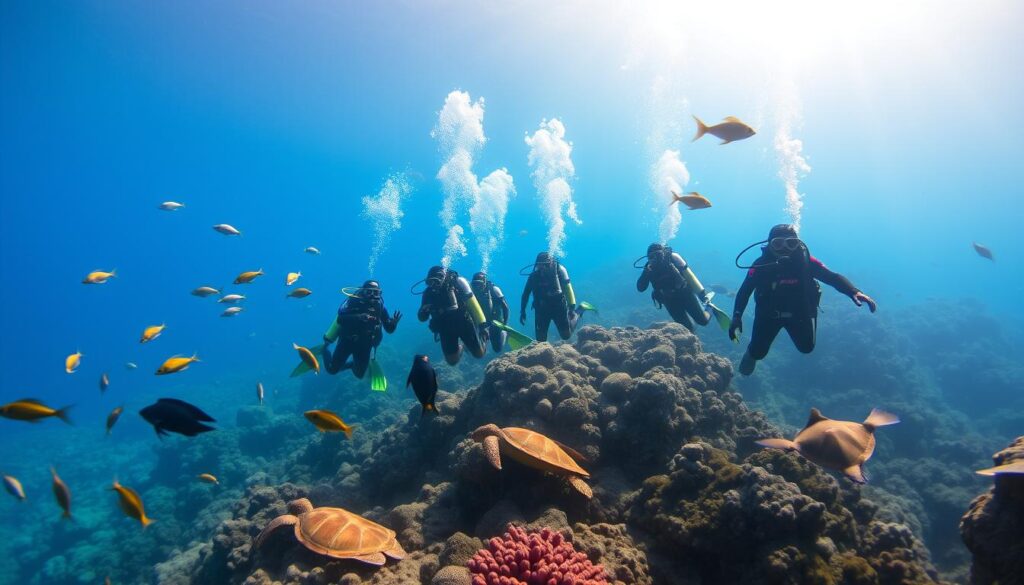
Introductory Courses for Beginners
Newcomers to scuba diving have several options in the Dominican Republic:
- Discover Scuba Diving: A great start at $80 for one dive or $120 for two dives
- Minimum age: 10 years old
- Includes hands-on training with expert instructors
Comprehensive Certification Options
Ready to dive deeper? The region offers many PADI Dive Certifications:
| Course | Duration | Price | Dive Requirements |
|---|---|---|---|
| PADI Open Water Diver | 3 days | $390 | 5 Confined Water Dives, 4 Open Water Dives |
| PADI Scuba Diver | 2 days | $300 | Partial certification option |
| PADI Referral Course | Flexible | $270 | 4 Open Water Reference Dives |
Advanced Learning Opportunities
Scuba Diving in The Dominican Republic goes beyond basic. Advanced courses teach special skills like:
- Deep Diving Techniques
- Underwater Navigation
- Night Diving
- Wreck Exploration
- Underwater Photography
“The ocean is a vast classroom, and every dive is a chance to learn something new.” – Professional Diving Instructor
All courses come with PADI materials and free equipment rentals. This makes learning to dive smooth and fun.
Excursions Beyond Diving
The Dominican Republic is a paradise for Snorkeling Adventures. Punta Cana boasts 25 diverse dive sites for underwater exploration. But snorkeling lets you see more of the marine world. The Caribbean Sea’s clear waters make it perfect for surface-level exploration, with visibility up to 120 feet.
Dominican Diving Resorts cater to all adventure seekers. Snorkeling around Saona and Catalina Islands reveals stunning underwater scenes. You can see vibrant coral reefs, up to 25 fish species, and enjoy water between 77-86°F. It’s a comfortable and thrilling experience.
Snorkeling Opportunities
Snorkeling is great for those who want to see marine life without scuba gear. Many resorts offer packages that mix diving and snorkeling. This lets you tailor your underwater adventures. The calm waters near Bayahibe are perfect for both new and seasoned snorkelers.
Land Activities to Combine with Diving
The Dominican Republic has a lot to offer on land too. You can zip-line through jungles, ride horses on coastlines, or visit historic sites like Santo Domingo’s Colonial Zone. These activities make your vacation exciting and memorable, with something for everyone.
Dominican Republic Recommended Scuba Diving Itinerary
Planning a scuba diving trip to the Dominican Republic can be an exciting endeavor, with numerous dive sites and regions to explore. To help you make the most of your diving adventure, we have prepared a recommended scuba diving itinerary that showcases some of the best diving the country has to offer.
Day 1: Arrival and Orientation
Upon arriving in the Dominican Republic, settle into your chosen accommodation and get oriented with the diving center or liveaboard you will be diving with. Familiarize yourself with the facilities, meet the dive staff, and complete any necessary paperwork. Take this opportunity to discuss your diving experience, interests, and goals with the dive professionals to ensure a personalized diving experience tailored to your needs.
Day 2-4: Bayahibe and Catalina Island
Start your diving journey in the Bayahibe area, located on the southeastern coast of the country. Explore the vibrant reefs and fascinating wrecks that dot the underwater landscape. Dive sites like the St. George Wreck and the Atlantic Princess offer captivating encounters with marine life, including reef sharks, stingrays, and a variety of tropical fish species. Spend a day exploring the pristine waters surrounding Catalina Island, known for its stunning coral formations and diverse marine ecosystems.
Day 5-7: Samaná Peninsula
Travel to the scenic Samaná Peninsula on the northeastern coast, renowned for its natural beauty both above and below the water. Dive along the spectacular walls, canyons, and swim-throughs that characterize the region. Visit dive sites like El Morro, La Farola, and The Tower, where encounters with eagle rays, reef sharks, and large schools of fish are common. If your visit aligns with the humpback whale migration season (January to March), seize the opportunity to embark on a whale-watching and diving excursion for an unforgettable experience.
Day 8-10: La Romana and Saona Island
Head to the La Romana area and dive in the captivating underwater world of Saona Island. Explore the coral reefs surrounding the island, teeming with colorful fish, sea turtles, and occasional manatee sightings. Dive sites like the Saona Wall and the Coral Gardens offer breathtaking underwater landscapes and a chance to encounter larger marine species. Take advantage of the pristine beaches and serene atmosphere to relax and unwind between dives.
Day 11-12: Puerto Plata
Travel to Puerto Plata on the northern coast, known for its intriguing wrecks and diverse marine life. Dive sites such as the Atlantic Princess and the Zingara provide opportunities to explore sunken vessels that have transformed into artificial reefs, attracting a wide array of marine species. Immerse yourself in the history and beauty of these wreck sites while enjoying the abundance of underwater life.
Day 13-14: Sosua and Cabarete
Conclude your diving itinerary in the Sosua and Cabarete area. Explore the underwater caves, fascinating rock formations, and captivating wrecks that make this region a diving paradise. Dive sites like the Zingara wreck and the St. George wreck offer thrilling and memorable experiences. Take the opportunity to unwind and enjoy the lively atmosphere of the beach towns, savoring delicious local cuisine and engaging in water sports and other activities.
Please note that this itinerary is a general guideline, and actual diving schedules may vary based on weather conditions, dive operator availability, and individual preferences. It is essential to consult with your chosen diving center or liveaboard to create a customized itinerary that suits your diving experience and interests.
The Dominican Republic offers a wealth of underwater treasures waiting to be explored. Embark on this recommended scuba diving itinerary to discover the country’s rich marine biodiversity, stunning dive sites, and unforgettable underwater experiences. From vibrant coral reefs to intriguing wrecks, the Dominican Republic promises divers an adventure-filled journey beneath its crystal-clear waters.
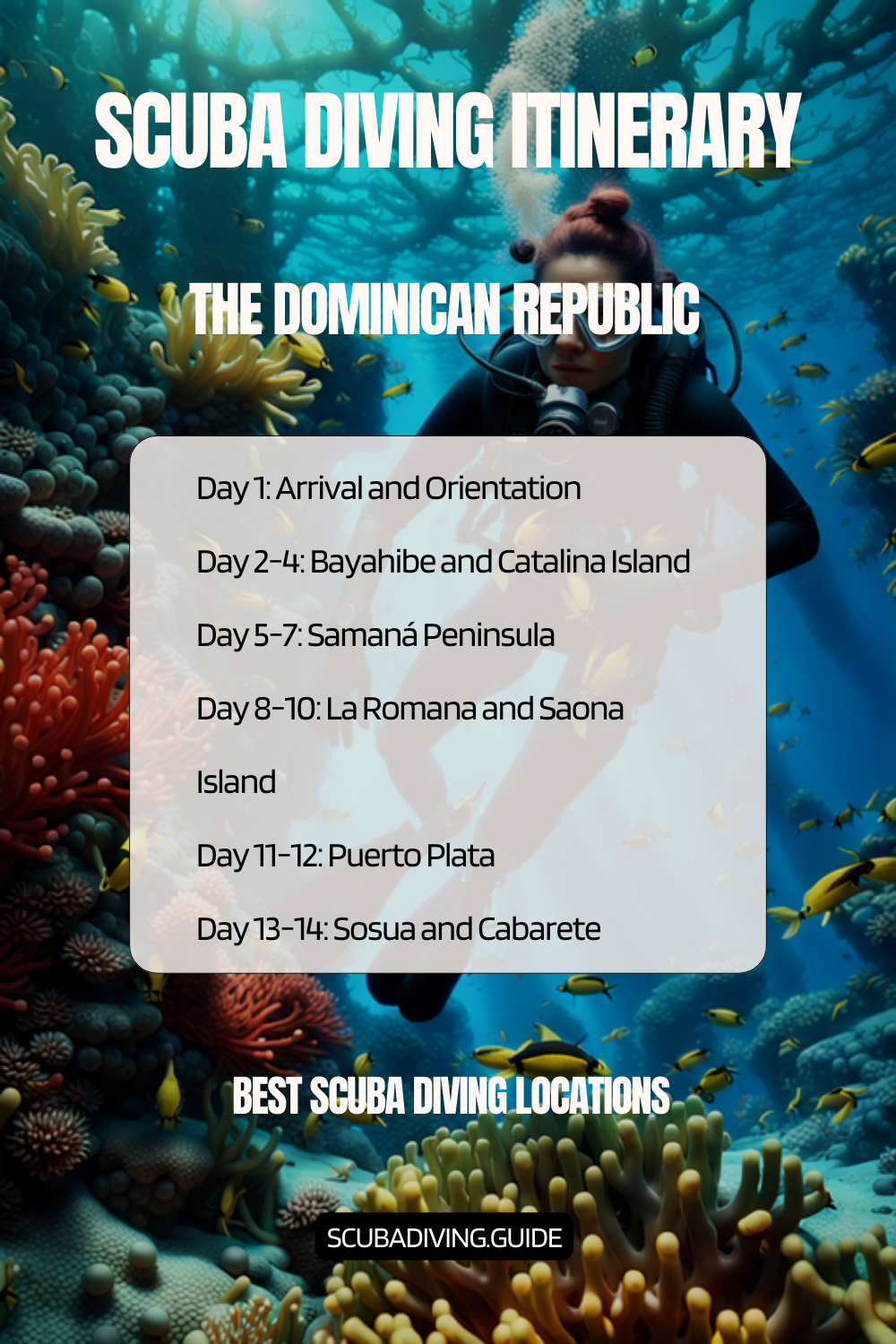
Other Countries to Consider
- Anguilla
- Antigua and Barbuda
- Aruba
- Bahamas
- Barbados
- Bonaire
- British Virgin Islands
- Cayman Islands
- Cuba
- Curaçao
- Dominica
- Grenada
- Guadeloupe Islands
- Haiti
- Jamaica
- Martinique
- Montserrat
- Puerto Rico
- Saba
- Saint Barthélemy
- Saint Kitts & Nevis
- Saint Lucia
- Saint Vincent and the Grenadines
- Sint Eustatius
- Sint Maarten
- The Turks And Caicos Islands
- Trinidad and Tobago
- United States Virgin Islands
FAQ – Scuba Diving in The Dominican Republic
What are the best months for diving in the Dominican Republic?
The best diving months are from December to March. This is when humpback whales migrate, and visibility is over 100 feet. The water is warm all year, between 75-83°F (24-28°C), making diving comfortable.
Do I need a diving certification to dive in the Dominican Republic?
Yes, most dive sites require an Open Water certification. PADI is widely recognized. Beginners can try diving with a Discover Scuba Diving experience.
What marine life can I expect to see while diving?
You’ll see tropical fish like parrotfish and sea turtles. Humpback whales are seen in winter. Dolphins and reef sharks are rare visitors.
Are there any notable shipwreck dive sites?
Yes, the St. George Wreck is a favorite for advanced divers. It’s a 240-foot freighter at 144 feet deep. There are also 1800s wrecks with artifacts like anchors and cannons.
Is night diving available in the Dominican Republic?
Absolutely! Night dives in Catalina Island and Bayahibe are popular. They let you see octopuses, lobsters, and bioluminescent creatures at night.
What type of diving equipment should I bring?
Bring your personal mask, dive computer, and wetsuit if you have them. Dive shops usually rent out tanks, weights, and other gear. Make sure your gear is in good shape for Caribbean diving.
Are there diving options for non-certified divers?
Yes, there are Discover Scuba Diving programs for beginners. These let you dive under supervision. PADI Open Water certification courses are also available for those wanting to dive fully certified.
What safety precautions should I take while diving?
Dive with a certified operator, follow safety rules, and stay within your limits. Use reef-safe sunscreen and respect marine life. Dive with a buddy and listen to your dive master.
Can I combine diving with other activities in the Dominican Republic?
Definitely! You can snorkel, hike, explore historic sites, zip-line, and horseback ride. Many resorts offer packages that include diving and other activities.
What is the cost of diving in the Dominican Republic?
Diving costs vary by location and type of dive. Single dives cost $50-$80, with package deals cheaper. Certification courses are $350-$500. All-inclusive packages make diving more affordable.
